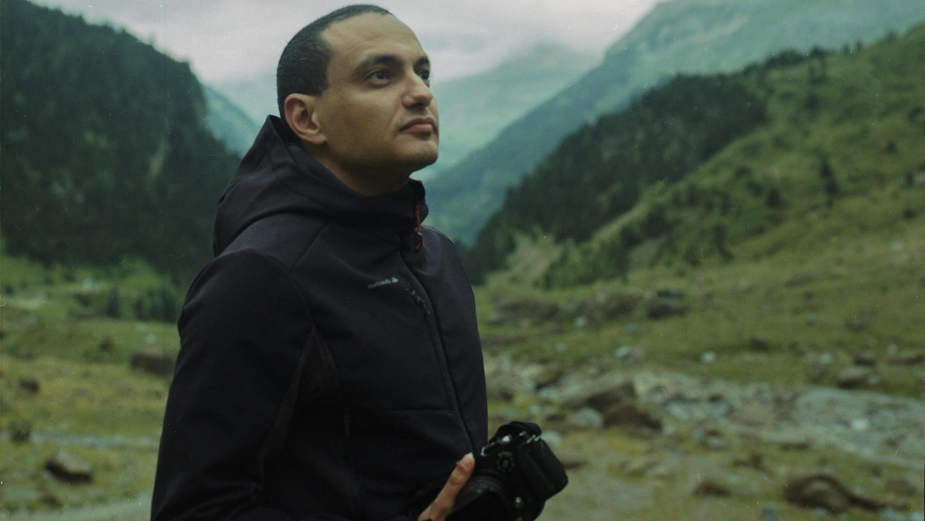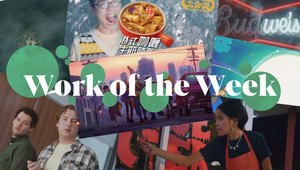
The Directors: Mustafa Mazouzi

Charming, talented and good at listening, Mustafa Mazouzi has the rare ability of understanding the aim of the creative process and knowing how to translate it into atmospheres. Intimate and beautiful, all his work breathes sensations that make each campaign something unique, realistic and truthful, by using visual codes that are in the collective imagination.
- Name: Mustafa Mazouzi
- Location: Paris
- Repped by/in: in Spain by The Production Club / in Paris by Quad Productions / in Europe, Russia and China by Viewfinder and in USA by Golden L.A
Q> What elements of a script sets one apart from the other and what sort of scripts get you excited to shoot them?
Mustafa> I always try to take a script as a whole. I don't try to differentiate the elements but to understand the general music. To see the whole picture. Then I try to understand how a story is going to be told. The atmosphere, the visual, the rhythm. But the element that controls all the others is emotion. It's this kind of scenario that interests me. Those who look the spectator in the eye, those who want to show a world as it is, in its most touching, real and sensitive aspects.
Q> How do you approach creating a treatment for a spot?
Mustafa> I start with the creative's intention. What do they mean that is not necessarily visible in the script? Then I try to find a moment or a personal experience that is close to the story. Something that will not exist in any other treatment than mine. Because that's what I'm asked to do, to have a vision of a script. And then I think about the images and try to find the visual intentions that would allow me to tell the story without any dialogue, without any text. Only the strength of the image, to find the right and punchy tone.
Q> If the script is for a brand that you're not familiar with/ don’t have a big affinity with or a market you're new to, how important is it for you to do research and understand that strategic and contextual side of the ad? If it’s important to you, how do you do it?
Mustafa> If I don't know a brand, I know that the creative team will give me all the major strategic aspects right from the start of the project. But I don't especially want to know everything. I like to be spontaneous and take a fresh look at things. If you want to know everything, you take the risk of making the same films that have already been made.
Q> For you, what is the most important working relationship for a director to have with another person in making an ad? And why?
Mustafa> All relationships are important! It's real teamwork. I have to understand everyone and be understood by everyone. The creative issues, those of the client, those of production are all complementary. It's a real psychological job, because I often find myself at the centre of all these issues and I have to bring my vision to life. And everything becomes easy when everyone just wants the best possible film.
Q> What type of work are you most passionate about - is there a particular genre or subject matter or style you are most drawn to?
Mustafa> I think I like real life, I like when you sublimate it with poetry, with simple but profound things. I like it when you put the human being at the centre of everything. That's what I like the most. And paradoxically, I love sport! I had the chance to make advertisements for Nike and adidas and there too, to tell the story of men and women through their efforts, their goals, their doubts and their hopes.
Q> What misconception about you or your work do you most often encounter and why is it wrong?
Mustafa> People often think that I don't like dialogue or that I'm not comfortable with it. And that's not true, I come from fiction, I've often worked with dialogue. But never in advertising! I very quickly made ads with atmosphere or emotion, in which the images speak more than the characters.
Q> Have you ever worked with a cost consultant and if so how have your experiences been?
Mustafa> I had the experience of a cost consultant who was very involved in the production of the film. He was very close to his client, and he was interested from the choice of cinematographer to the colour of paint we were going to use on the wall! It was very intrusive but it didn't matter. These are little games that in the end don't change the film I have to make.
Q> What’s the craziest problem you’ve come across in the course of a production – and how did you solve it?
Mustafa> I had to make a sports film with the feeling of spring and summer. But we were shooting in January in Belgrade with a lot of location shots, including a football scene between two teams. There were 30 centimetres of snow, an icy cold. We had to shoot at night. The football field was on top of a building and the lift was too small to take the dolly and the lights up. It was the last day of shooting, the last scene. We wanted to finish. We postponed the last day of shooting for a fortnight. Sorry I couldn't find a magic solution!
Q> How do you strike the balance between being open/collaborative with the agency and brand client while also protecting the idea?
Mustafa> It's a question of respecting and creating the space. I've always told myself that I have to respect the wishes of those who trust me, and those who put money on the table. This is obvious to me. But as I said, it takes a good dose of psychology to create the space for my vision. I always start, on a shoot or in the editing room, by presenting what I think is best for the film. Without arrogance, always with an open mind. And if we don't agree after talking, after exchanging our feelings, then the agency and the client will always get what they ask for. Because people often need to see something concrete and often they go back a bit in their judgement.
Q> What are your thoughts on opening up the production world to a more diverse pool of talent? Are you open to mentoring and apprenticeships on set?
Mustafa> Yes, this is very good. The more talented people there are, the more new ideas there will be. And diversity brings new perspectives. We are creative, we have to be constantly on the move and not stop at one way of working.
Q> How do you feel the pandemic is going to influence the way you work into the longer term? Have you picked up new habits that you feel will stick around for a long time?
Mustafa> I don't know if it's a new way of working, but it will be a new way of talking to people. We went through a period where we asked ourselves a lot of questions. Essential things that we had forgotten caught up with us. I hope there will be even more sincerity and humanity in our stories.
Q> Your work is now presented in so many different formats - to what extent do you keep each in mind while you're working (and, equally, to what degree is it possible to do so)?
Mustafa> Each format gives a different perception of my work. Depending on the project it is not always easy to reconcile them all and achieve the same impact. But my approach has changed when I think about my films. I try to find that point of convergence where all the formats will all tell the same story. But I am a director who shoots a lot on the set. I always have a material that allows me to adapt. But the formats mostly tell us about the diversity of the people who go to see my work. I think that today you have to tell yourself that everyone is watching everything. And integrate it into our creative process.
Q> What’s your relationship with new technology and, if at all, how do you incorporate future-facing tech into your work)?
Mustafa> As long as a technology serves a creative intention and an emotion, I am interested in it. A technology that is disconnected from the viewer's experience and my story is just a trend. I talk to a lot of cinematographers and post-production managers about new technologies and I test a lot of things as soon as I can. I never try to make my work easier, I try to push the creative limits and it's very subjective. Not all technologies are good for all directors. Interactive storytelling interests me a lot for example. I would like to see what the viewer can bring to one of my creations.













